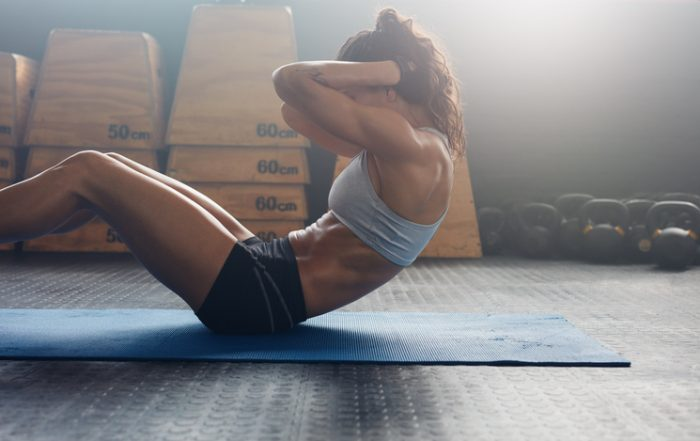
02 Nov What does under-eating and over-training do to a woman’s body?
If you are a woman and both under-eating and over-training, then you are at severe risk of losing your long-term health. You see, a woman’s body is an extremely complex and sensitive thing that needs sustained energy to do what it was designed to do at its most base level… be one half of the system that keeps the human race alive. Like it or not, the female body is built around creating an environment to produce eggs, have them fertilised, grow embryo’s and carry a child to full term.
To ensure the health and wellbeing of the carrier, the woman, the body is designed to shut down any non-essential processes during times of stress. As the human race developed, this was times of danger and famine: the classic old-world stressors. Sexual function and procreation are on this list of things that aren’t needed when you are 1. being hunted and 2. at risk of starvation.
Today, the nature of our stressors has changed but the body doesn’t recognise that… a stressor is a stressor is a stressor. Stressors are anything that tax our SNS (Sympathetic Nervous System). Nowadays, our stressors are different. They can include a combination of any of the following in everyday life: finances, kids, relationships, the mental and physical demands we put on ourselves, excessive caffeine, lack of sleep, for teens it could also be school, parental pressure, peer pressure, bullying…
Many women throw into this mix restrictive eating (including, but not exclusive to, things like vegetarianism, fad diets, carb restriction) excessive fasting or calorific control and definitely excessive exercise and/or too much extremely high intensity exercise such as Crossfit Metcons, HIIT and sprint work.
In fact, it is such a problem in the sports world it has a name: Female Athlete Triad or FAT. It’s a shame it’s been tagged with this name because most suffering are NOT athletes, and women think “That’s not me. I’m not a high-level athlete, you must be doing superhuman feats to suffer from this issue.” Not true. The Female Athlete Triad is the combination of hypothalamic amenorrhea (loss of period for more than 3 months), low bone mineral density and energy deficiency, usually but not always due to disordered eating and restrictive eating practices.
So how does this happen?
If a woman is on some form of restrictive diet and/or she’s over exercising, 1. She has too little energy going in and 2. she has too much energy going out. She is now in what is called ‘negative energy balance’. Over time, as her body fat decreases and her leptin levels drop, the body sees this as being a threat to her survival so begins shutting down non-essential human processes, such as the whole reproductive cycle, rendering her infertile and her period stops: amenorrhea.
This can happen at different levels for different women. Some are naturally leaner than others and some are more sensitive than others. The loss of your period is disrupting the natural hormone cycles of the body and this is not a good thing!
The diagram below shows how the we start at the healthy end of the triangle: great nutrition, strong bones and regular menstrual cycles (Green). As we slide down the scale, not eating enough to cover the energy expenditure caused by our activity, periods become irregular and bone density lowers as the body struggles to create new healthy cells (Blue). Finally, we have continued low energy availability, complete menstrual dysfunction in the form of Functional Hypothalamic Amenorrhea and onset of Osteoporosis (Red).

Image sourced from: 2014 Female Athlete Triad Coalition Consensus Statement on Treatment and Return to Play of the Female Athlete Triad
But if I’m not having kids how is this unhealthy?
The biggest and quickest issue to appear is bone health. Estrogen and progesterone help to regulate bone cells, called osteoblasts, which are responsible for building new bone. When these hormone levels drop, fewer cells are produced and bone is lost, but not replaced. So, you lose bone density and run the risk of stress fractures and osteoporosis.
“What about if I add in more strength training… that’s good for bone density?” If you were eating normally YES, but if you are over-training and under-eating you can’t just strength train your way out of the problem.
“But I eat purely organic and supplement with all the right high-quality supplements for bone health?” Yes, but you are over-exercising and not eating enough. No matter how high quality the food… eat more!!!
You’ve probably heard the saying that you can’t outrun a bad diet. Well, in this case you can’t out-strength train or supplement your way out of amenorrhea.

So, what are the health consequences of long-term under-eating and over-training?
- Fatigue and low energy
- Circulation issues presenting with cold hands and feet
- Hair loss
- Occasionally facial hair growth
- Disrupted sleep
- Anaemia (low iron)
- Skin issues (dry flaky skin, acne, etc.)
- Weight changes and changes to where you put on body fat
- Inflammation in body and joints
- Increased risk of soft tissue damage (tears, sprains, strains)
- Increased injury healing time
- Anxiety / OCD, low self-esteem and/or depression
- Orthostatic hypotension
- Electrolyte irregularities
- Vaginal dryness or thinning of tissues
- Elevated carotene in the blood
- Bradycardia (slower than normal heart rate)
- Chronic pain – general soreness, stiffness and achiness
- Digestion issues bloating, constipation, diarrhoea
- Breast size changes
Under-eating/over-training has an accumulative effect: the longer you are in the triad, the more long-term and severe the symptoms can be, with some becoming irreversible in the long-term or causing severe health issues in later life.
What can you do if you feel you are under-eating or over-training (or know someone who is)?
This is where the problem lies. Most girls/women who have this issue are in denial that they have an issue or how severe that issue is. Successful long-term treatment needs to address the underlying issues, which are usually mental and emotional. In the meantime, energy input and output must be normalised. Seek professional help, before permanent irreversible damage is done. check out people like the https://thebutterflyfoundation.org.au or seek out a good psychologist.
References:
- The Female Athlete Triad – Medscape – Oct 01, 2007 Aurelia Nattiv, M.D., FACSM; Anne B. Loucks, Ph.D., FACSM; Melinda M. Manore, Ph.D., R.D., FACSM; Charlotte F. Sanborn, Ph.D., FACSM; Jorunn Sundgot-Borgen, Ph.D.; Michelle P. Warren, M.D.
- 2014 Female Athlete Triad Coalition Consensus Statement on Treatment and Return to Play of the Female Athlete Triad: 1st International Conference held in San Francisco, California, May 2012 and 2nd International Conference held in Indianapolis, Indiana, May 2013 – Mary Jane De Souza, Aurelia Nattiv, Elizabeth Joy, Madhusmita Misra, Nancy I Williams, Rebecca J Mallinson, Jenna C Gibbs, Marion Olmsted, Marci Goolsby, Gordon Matheson (expert panel)



Sorry, the comment form is closed at this time.